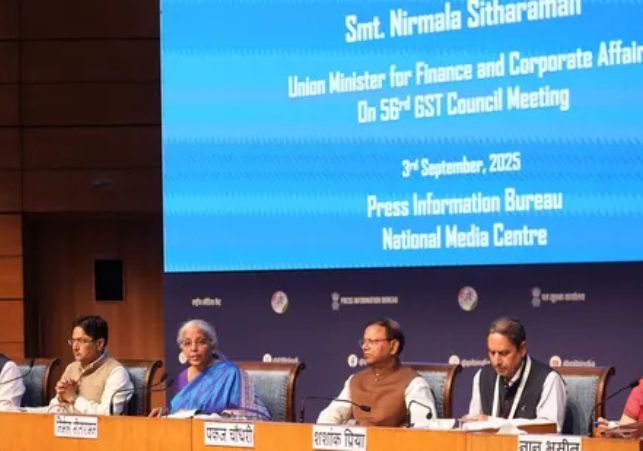56th GST Council meet introduces two-rate tax slab effective September 22; Govt retains 5% and 18% slabs


56th GST Council meet introduces two-rate tax slab effective September 22; Govt retains 5% and 18% slabs
Digital Desk: The Goods and Services Tax (GST) Council, in its 56th meeting, has approved a revised tax structure, moving towards a predominantly two-rate system comprising 5% and 18%, as put forth by the Central government.
Union Finance Minister Nirmala Sitharaman announced that these changes are slated to be implemented for most goods by September 22, with tobacco and related products to be transitioned to the new structure at a later, unspecified date.
Additionally, a 40% "special rate" will be applied to "sin goods," which include tobacco, as well as luxury items such as large cars, yachts, and helicopters.
Common household items such as hair oil, soap, shampoo, toothbrushes, toothpaste, bicycles, and kitchenware will move to a 5% rate from 18% or 12%.
Food items, including namkeens, sauces, pasta, noodles, chocolates, coffee, and butter, will also be taxed at 5%. Certain bio-pesticides, bio-menthol, handicrafts, marble, granite, and leather goods will shift from 12% to 5%.
Cement's tax rate will decrease from 28% to 18%. Notably, ultra-high-temperature milk, paneer, and Indian breads such as rotis, chapatis, and parathas will become tax-exempt, moving from a 5% to 0% tax rate.
Several product categories are experiencing a reduction in GST rates from 28% to 18%, including air conditioners, televisions, dishwashers, small cars, and motorcycles with an engine capacity of up to 350cc.
Buses, trucks, ambulances, and all auto parts will also be taxed at 18%. Additionally, 33 life-saving drugs and medicines will have their GST reduced from 12% to 0%, and spectacles for vision correction will see a decrease from 28% to 5%.
Individual health and life insurance coverage will be reduced from 18% to 0%.
Ms. Sitharaman went on to explain that the GST rate on pan masala, gutka, cigarettes, chewable and unmanufactured tobacco, and bidi would stay at 28%, in addition to the present compensating cess.
Once the Centre repays the debts it borrowed to compensate states, tobacco and tobacco-related commodities will be subject to the 40% rate. Ms. Sitharaman stated that the loan would most likely be repaid within this calendar year.









